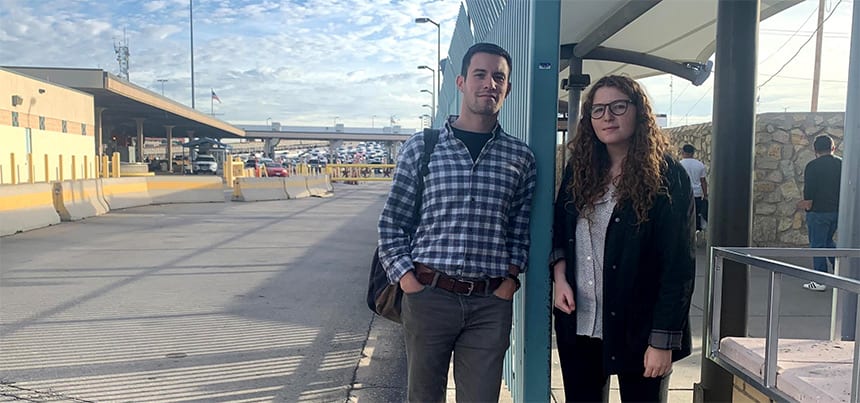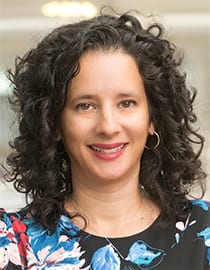
By Gwyneth K. Shaw
Isabel and her husband Chris fled Venezuela with their two toddler children after political activism against the country’s president prompted attacks from paramilitary groups. Roberto left Cuba after being harassed and abused because of his political activities and race. Alejandra and Victor took their three children away from El Salvador after filing a police report against leaders of the notorious MS-13 gang.
All are stuck in limbo in Ciudad Juárez, Mexico, trapped by the U.S. government policy known as Remain in Mexico or the Migrant Protection Protocols, which forces migrants seeking asylum in the U.S. to return to Mexico while their applications are processed. Their paperwork lists a single shelter in Mexico as the place where required notices about their legal cases should be sent—a shelter they all told students from Berkeley Law’s International Human Rights Law Clinic they’d never heard of.
In fact, they had provided a valid address for relatives in the U.S., but immigration officers chose to manufacture the address included in their paperwork.

Their stories, and those of a dozen others, form the backbone of an amicus brief the clinic filed Dec. 23, to encourage the U.S. Supreme Court to take the case of Melida Teresa Luna-Garcia. Clinic Co-Director Roxanna Altholz ’99 worked with four Berkeley Law students on the brief, and traveled with two of them to Ciudad Juárez to interview 23 asylum seekers in person. (The names used in the brief, and above, are pseudonyms to protect their identities.)
Luna-Garcia fled Guatemala with her 3-year-old daughter after members of her family agreed to cooperate in a rape-murder prosecution of an alleged gang member in the U.S. When detained after crossing the border, she gave the address for her home village. But the U.S. government refused to mail notice of her deportation proceedings to the foreign address. An immigration judge ordered her removed in absentia when she failed to show up for her immigration court hearing despite her never receiving notice of its time, date, and location.
Earlier this year, the U.S. Fifth Circuit Court of Appeals denied Garcia’s appeal, holding that federal law required a U.S. address and the government had no obligation to notice a foreign address. Under this decision, if asylum seekers fail to appear for their hearings although they never received notice, U.S. law allows them to be deported in absentia. Luna-Garcia’s lawyers have asked the Supreme Court to take the case.
The clinic’s brief supporting the request argues that international law requires the U.S. government to do everything it can to provide notice of all proceedings to those seeking asylum, regardless of where they are. So far, more than 50,000 people have been forced to return to Mexico, and almost all of them have a foreign address (sometimes manufactured by government officials) or no address listed on their paperwork.
The Fifth Circuit’s decision “violates internationally protected due process safeguards and magnifies the risk that individuals with credible fear of persecution will be returned to harm in violation of the prohibition against refoulement,” the brief says.
Powerful stories
Altholz said the idea for the interviews came from the clinic’s client on the brief, the Justice Action Center, founded by Karen Tumlin ’04. Las Americas Immigrant Advocacy Center, based in El Paso, and Catholic Legal Immigration Network, the largest network of nonprofit immigration programs in the U.S., are also involved in the brief.
“Both U.S. and international law require the United States to ensure that asylum seekers have their day in court by providing notice,” Altholz says. “The firsthand accounts of people fleeing violence trapped in a broken immigration system demonstrate the human consequences of the Fifth Circuit decision and why the Supreme Court should hear this case.”
She also sees using the personal stories as an antidote to decades of efforts to criminalize migrants.
“We want to explain why they’re coming to the United States, which in the case of these individuals is that they’re fleeing for their lives,” Altholz says.
The approach to the brief has also been a great opportunity for the four students working on it: Lizzy Brilliant ’21 and Isaac Flegel-Mishlove ’21, who went to Ciudad Juárez, and Sydney Beada ’22 and Carmen Lam ’20, who didn’t travel but put in countless hours researching and writing the brief.
“It’s really great to have the Supreme Court justices actually hear about the issue from individuals who are seeing and being affected by these policies on the ground. These stories bring emotion into the brief, and allow the justices to better see themselves in these policies and connect with them. Our brief frames the issue in human terms, not just legal terms,” Brilliant says. “In law school, you’re reading a lot of cases about issues that have already been settled. The clinic offers you the opportunity to deal with issues that aren’t, adding a whole other level to the experience.”
Flegel-Mishlove says he wasn’t surprised by what he saw in the border city, but that the experience amplified his anger and disappointment at the government’s policies.
“One recurring theme that we heard was an overwhelming feeling of being silenced, of voicelessness,” he says. “They feel afraid that no one will ever know their story, understand the dangers they have courageously escaped from, or see that their journey to the United States is about securing safety for themselves and for their families.”
For Beada, who dug deeply into international law to help frame the brief’s argument, it was a privilege to explore terms and doctrines rarely seen in U.S. law. She also enjoyed working with a team, and says Altholz’s ability to be both a teacher and a supervisor helped the group enormously.
“For me, it was very, very special to get to finish and have a physical work product,” Beada says. “That’s not something you get in a lot of other classes. I’m not sure I realized how important that was going to be before I signed up for the clinic.”
Altholz praised the students, who came to the project with a sophisticated understanding of international and immigration law as well as the skills to conduct the interviews and then distill them into a compelling, persuasive argument.
“The team had an impeccable work ethic,” Altholz says. “They took on a challenging project and were willing to put in the time and the energy that was needed to do it successfully.
“This type of work is the soul of this clinic.”